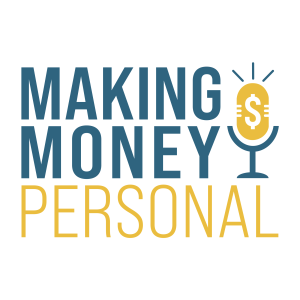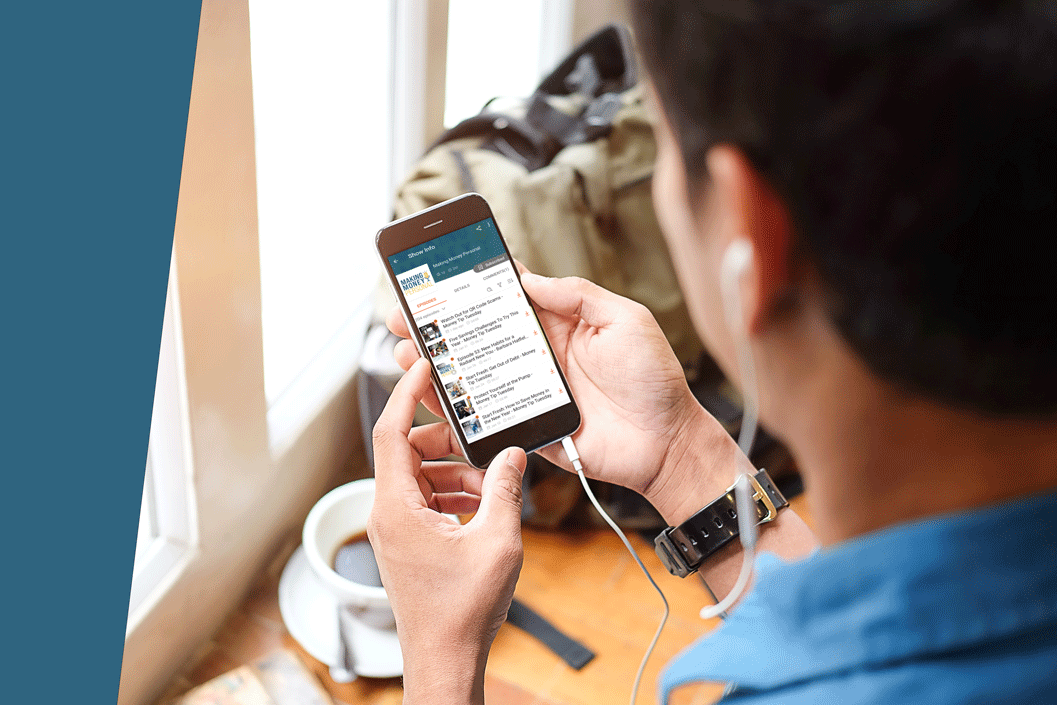Episodes

Tuesday Aug 15, 2023
What To Keep In Mind When Buying Bulk - Money Tip Tuesday
Tuesday Aug 15, 2023
Tuesday Aug 15, 2023
Have you ever run out of something and wished you had bought more when you were at the store? Buying in bulk can often fix this problem. You get more bang for your buck, with bulk prices generally being cheaper than buying the same amount of the item individually.
Plus, you also have a bigger supply and won’t have to go shopping as often. However, there are some items that you do not want to buy in bulk as they just aren’t worth it. Here are some items to put on your bulk shopping list, and some you should remove.
Links:
Follow us on Facebook, Instagram and Twitter!
Learn more about Triangle Credit Union
Transcript:
Welcome to Money Tip Tuesday from the Making Money Personal podcast.
First on our bulk shopping list is food. Food can be tricky when buying in bulk, as it can expire if you don’t eat it fast enough. Canned goods are a great food to buy in bulk. When buying them in bulk, the prices are typically 30% percent cheaper than buying them individually. Always check the expiration date on the cans first, as you don’t want to buy a whole bunch of them if you don’t think you can eat them all before they expire.
If you have a big freezer, buying meat in bulk is a great idea. If you go to a local butcher store, you can get large quantities of meat for cheaper prices than you find in a grocery store. However, you may want to get a vacuum sealer to avoid freezer burn.
If you drink coffee once (or twice) a day, you should also buy that in bulk. Buying individual bags, pods, or drinks can quickly add up over time. Buying it in bulk is cheaper, especially if you drink a lot.
Pasta is another food you should buy in bulk. Pasta doesn’t take up a lot of space in your pantry, plus when it is sealed properly, it can last up to two years.
While not for you to eat, pet food is a great investment when buying in bulk. Chances are you feed your pet the same thing every day, so you know that you will have to keep buying it. Buying pet food in bulk allows you to save money on pet expenses and keep your pet happy.
However, there are definitely some foods that you should not buy in bulk. One example of this is fresh fruit. Fresh fruit doesn’t last very long, and chances are you won’t be able to eat all of it before it expires. Buying fruit in smaller quantities allows you to eat all of it before it expires. Plus, when buying fresh fruit in bulk, you most likely won’t inspect the fruit to see if it’s good to eat. If you still plan on buying fruit in bulk, try buying frozen fruit, as it will last longer.
Another food you shouldn’t buy in bulk is nuts. Although it is tempting since they are a lot cheaper to buy in bulk, the high fat content in nuts can make them turn rancid faster. Similarly, spices are another item to not buy in bulk, as they begin to lose their flavor after 6 months. A good rule of thumb is if the food has a close expiration date, don’t buy it in bulk.
Moving on from food, paper materials are always a great purchase in bulk. Tissues, toilet paper, and paper towels are a great investment, as you will always need them, they don’t go bad, and they are cheaper when you buy them in bulk.
Likewise, all cleaning supplies are great and cheaper in bulk. This can include laundry detergent, soap, shampoo, toilet cleaner, and even toothpaste.
However, if there’s an item that you can buy in bulk but don’t use very often, don’t buy it. Just because it might be cheaper in the long run, doesn’t make it worth it. Remember, you still have to store all of this stuff at your house. Only buy what you know you will use.
If there are any other tips or topics you’d like us to cover, let us know at tcupodcast@trianglecu.org and don't forget to like and follow our Making Money Personal Facebook, Instagram, and Twitter pages and look for our sponsor, Triangle Credit Union on Instagram and LinkedIn to share your thoughts.

Tuesday Aug 08, 2023
What to Consider Before Buying Pet Insurance - Money Tip Tuesday
Tuesday Aug 08, 2023
Tuesday Aug 08, 2023
For many of us, our pets are a part of our family. They bring us excitement and comfort that we enjoy for many years. But pets also come with costs.
With all the costs you need to dish out for pets, like grooming, food, supplies and more, another expense to consider is pet insurance. With the costs already associated with owning a pet, is it worth paying for pet insurance too?
Links:
Explore more about the pros and cons of pet insurance
Follow us on Facebook, Instagram and Twitter!
Learn more about Triangle Credit Union
Transcript:
Welcome to Money Tip Tuesday from the Making Money Personal podcast.
When it comes to affording the things we want in life, our pets likely sit close to the top of our list.
But as pet owners often learn, having a pet comes with responsibilities that can take up a lot of resources. One of these responsibilities is keeping your pet’s health which may wind up costing you money in vet bills and care.
The reality is that pet bills can be expensive.
It can be devastating when your pet faces a crisis that may leave you struggling to decide between your pet’s life or your financial health.
Let me tell you a story. A friend of mine got a new puppy and within weeks of getting this little bundle, the puppy had a serious emergency and my friend had to rush him to the emergency vet. The vet was able to save the puppy’s life, but my friend was left with a bill for over 60K for all the costs associated with the care and treatment.
Regardless of whether you think that’s enough or too much money to spend on an animal, before you pass any judgement, ask yourself how much you’d be willing to pay for your animal and whether it would be worth paying for coverage in case a situation like this arises.
There’s no right or wrong answer on whether to buy pet insurance, but if you’re serious about dishing out money for expensive care and treatment, it may make sense to purchase pet insurance.
If you choose the right option, it can give yourself a healthy financial buffer to avoid getting buried in pet medical bills.
There are three types of pet insurance coverage you should be aware of.
The first is accident-only. This covers only accidents and includes any testing, procedures and medications related to the accident. It can cost roughly $130/yr for cats and $239/yr for dogs.
The second is accident and illness. This one includes everything covered in an accident-only policy. It also covers common and serious illnesses your pet may endure as well as certain hereditary conditions. It covers any testing, procedures and medications related to anything from accidents to illnesses and can cost roughly $342/yr for cats and $583/ for dogs.
The third is routine wellness. This covers routine and preventative care as well as wellness care like routine checkups, vaccines, flea and heartworm prevention. It does NOT cover illnesses and accidents and is considered more of an optional add-on to existing plan coverages
If you’re considering pet insurance, here are a few ways to determine if pet insurance is worth it for not only your finances but also your four-legged friend.
Pet insurance does depend on a few things.
It depends on the type of pet you have and it’s specific needs. Larger animals like dogs will generally cost more in premiums than smaller animals like cats. In many cases, companies do not cover animals other than cats or dogs so you may have to do some hunting to find a company that might cover your specific pet.
It depends on how much are you comfortable spending on pet expenses. Sometimes a $1,000 bill is doable, but is a $10,000 bill worth it? If you don’t want to pay for pet insurance, you may want to put some money aside for your pet in case something does happen. Determine your financial limit then set up a sinking fund specifically for pet costs so you can cover any unexpected issue that may occur.
It’s depends on how old your pet is. The age of your pet will determine how much you’ll pay in premiums. The younger your pet is when you buy insurance, the cheaper your premium will be.
It depends on what type of breed your pet is. Some pet breeds are more prone to illnesses and health problems than others. If your breed is more likely to develop certain medical issues with age, you may need to prepare for some of the health care costs associated with those genetic pre-dispositions that can show up down the line.
It depends on whether your pet has pre-existing conditions. Not all insurance may cover these, so make sure you know before signing up for something that won’t cover your costs.
Taking care of your beloved pets and your financial health should both be at the top of your priority list. That’s why it’s important to weigh the options to make sure you take the best care of not only your pet’s health but your financial health as well.
If there are any other tips or topics, you’d like us to cover, let us know at tcupodcast@trianglecu.org. Like and follow our Making Money Personal FB and IG page and look for our sponsor, Triangle Credit Union on social media to share your thoughts.
Thanks for listening to today’s Money Tip Tuesday and be sure to check out our other tips and episodes on the Making Money Personal podcast.
Have a great day!

Tuesday Aug 01, 2023
This Simple Tool Can Help You Defeat Debt - Money Tip Tuesday
Tuesday Aug 01, 2023
Tuesday Aug 01, 2023
Have you been burdened by an ever-growing credit card balance? According to CNBC, the average American carries around $5,733 in credit card debt. Some have more, others less. But almost everyone wants it gone.
Believe it or not, there’s a simple method to reversing that growing credit card debt. It’s not the easiest method, but once you perfect it, you can kiss all that accumulating debt goodbye.
Links:
Learn more about Triangle's Checking Account and how to get your debit card
Follow us on Facebook, Instagram and Twitter!
Learn more about Triangle Credit Union
Transcript:
Welcome to Money Tip Tuesday from the making money personal podcast.
How many credit cards do you have?
If you’re like me, you probably have at least two or three.
Do you pay them off regularly?
I’ve been one to pay my card balances regularly, but with increasing costs of goods and the occasional impulse purchase, a couple small vacations and a few home repairs, those balances grew faster than I was able to keep track of.
So I started the credit card juggling act.
If one card balance was coming due, I’d simply start putting charges on a different card. I’d pay off the card balance that came due but continued to add other cards in the mix until I was juggling four separate cards with revolving balances all due at different times of the month.
Talk about a headache. Not to mention how confusing it can get trying to make sure I had enough money in my bank account to cover each balance as it came due.
I crunched a lot of numbers, studied calendars, set up notifications to keep myself on track. And the credit card carousel went around and around and around.
As I worked my way through these financial gymnastics month after month, I started to realize my balances weren’t going down. Instead, my debts were accumulating week by week. As a result, I needed to do more math and pay even closer attention to the charges I was making.
But they were necessary expenses. Or so I thought. Aside from groceries the other highest expense category was dining out. And we all know that hasn’t gotten any cheaper over the last year.
That’s when I decided, in order to keep my financial health in check, I needed to make a change. And I’m glad I did.
If you’re riding that carousel too and juggling credit cards month over month, accumulating debts and getting stuck paying interest every month, then it’s time for you to make that change too. With some planning and discipline, it’s entirely possible and I’ve been able to eliminate my credit card debt doing this.
This is one simple change even you can make and you’re likely already holding the key.
The key I’m talking about isn’t a fancy debt consolidation loan or balance transfer, though sometimes those help, this one is common, convenient and doesn’t cost a thing. It’s your humble debit card.
As my revolving credit cards kept digging me deeper and deeper into debt, I realized it was time to break out that dusty debit card sitting forgotten at the bottom of my wallet.
This little card was going to save my accounts from sinking deeper into debt.
Now that I had the tool, the next thing was to come up with a strategy on how I would use it to pay down the debt.
This is where the planning and discipline came in.
The plan was simple. Any and all new charges had to be put on this card. No more credit cards allowed.
The practice was a little harder to implement.
All of my charges went on debit card.
I didn’t add any new charges to my credit cards. Yes, I had to say goodbye to earning points and miles, but for the sake of financial security, it’s the better choice.
I cut back on things I was purchasing. I’d scope out the deals, avoid impulses, stopped buying extra things online. Essentially stretched my dollar a little bit more.
I had to keep a close eye on my checking account because once that number went too low, I could no longer spend any more. All I could spend was what I had.
Then as paychecks came in, I would pay any credit card bill I had as best I could.
After making sure I had enough money in my checking account to cover necessities, I would put extra towards any of my remiaing credit cards.
If I could throw an extra $100 towards a bill I did. If I could throw an extra 50 I would. It depended on how much I had at the time but any amount counted.
This process took a few months to work through, and for some it might take longer than that, but if you plan it right and stick with it, it will work.
Credit cards give you a lot of convenience, but they often tempt you in more ways than you realize.
The juggling act can work for a time, but it can send you dangerously towards racking up more debt than you can pay off.
Using your debit card keeps your spending in check because it stops you from spending money you don’t already have. You’re forced to make more thoughtful purchases and pay closer attention to the items you buy.
If there are any other tips or topics, you’d like us to cover, let us know at tcupodcast@trianglecu.org. Like and follow our Making Money Personal FB and IG page and look for our sponsor, Triangle Credit Union on social media to share your thoughts.
Thanks for listening to today’s Money Tip Tuesday and be sure to check out our other tips and episodes on the Making Money Personal podcast.
Have a great day!

Tuesday Jul 25, 2023
Simple Ways to Save Money - Money Tip Tuesday
Tuesday Jul 25, 2023
Tuesday Jul 25, 2023
If you’ve been crunching those numbers lately trying to figure out how you’ve been spending your money you might have come to the realization you need to cut some expenses.
With a quick review and a few simple hacks you can cut back on unnecessary spending and free up some cash.
Links:
Resources and statistics mentioned in this tip:
Interesting coffee facts
Stats on the cost of dining out
Forbes survey results on the cost of streaming services
RunRepeat survey results for the cost of gym memberships
Find how much handyman and home jobs on AllBetter app might cost you
Learn how much you could save shopping secondhand or used items
Follow our Facebook, Instagram and Twitter pages!
Learn more about Triangle Credit Union
Transcript:
Welcome to Money Tip Tuesday from the Making Money Personal podcast.
Saving even a little bit of money these days can make a world of a difference for your finances.
Here are a few places you can look to start if you’re ready to cut back on your spending.
Number 1: Consider cutting out that regular cup of coffee.
If you’re used to buying your daily cup of joe, you may be spending more than you realize.
As of 2023, the average cup of coffee in the US costs $3.28. If you’re a regular drinker, that means you spend roughly $10 – $16 a week depending on how often you purchase your coffee. And that doesn’t even include tip.
If you’re buying your morning brew 3 times a week that means you’ll be spending roughly $520 a year on coffee. If you buy one every day of the week, then you’re spending around $832 a year on your coffee.
If you don’t like the thought of spending half a grand to almost a grand on coffee a year, then there’s an easy fix for you. Simply cut back buy buying less frequently or make your own coffee at home.
A cup of homemade coffee can cost between 18 - 27 cents. That’s a big difference from buying one from your favorite coffee shop.
Number 2: Dial back on dining out. This one is pretty obvious. Many of us spend more than we realize on dining out.
According to the Bureau of Labor Statistics, the average American dines out 5.9 times per week and the average household spends roughly $3,500 a year on it. That’s around $291 a month.
Are you comfortable affording that?
If that seems like too much for you to afford, then it’s time to take a closer look at how much you’re spending on food you don’t cook at home.
If you’re not ready to cut it out entirely, because it provides some relief from a hard day’s work, try cutting back on the number of times you go out, choosing cheaper establishments, or cutting out expensive options when you do go out like alcoholic drinks, apps or desserts.
Number 3: Cut back on streaming services, or other subscriptions.
If you’re like me, you’re probably paying for more than one streaming service every month. According to a 2023 Forbes survey, the average person is subscribed to 2.8 streaming services with some subscribing to five services at a given time.
The survey also showed that the average person spends $39 a month on streaming services which can add up to $486 a year and it also showed that 47% of people are paying for streaming services that go unused.
If you find you’re paying too much simply cancel some and stick with the one you like the most or cancel all and opt for free TV instead. You’ll likely have to endure commercials, but that can be a small price to pay for the money you’ll save over time.
Number 4: Lose your unused gym or fitness memberships.
Gym memberships can be costly.
According to a 2021 survey done by RunRepeat, the average cost of a gym membership is around $37.71 a month. That comes to about $452 a year.
The saddest part of this is that most people don’t end up using the membership as often as they planned, with many not using it at all. Even if you’re only paying $10 a month fee, it’s still a waste.
Pay attention to how much you’re dishing out for your fitness and if you find you’re one of those people paying for something you’re not using, cancel your membership and opt for other, cheaper ways of training instead.
Walking or running outside, getting involved in recreational activities, even free YouTube videos are great ways of keeping up with your fitness goals without paying for an unused membership.
Number 5: Learn how to DIY things. In many cases, it’s cheaper to do a job yourself than to pay someone else to do it for you.
Things like learning how to change your own oil, repair drywall, change out light fixtures or unclog a sink can save you a lot of money when you take a little time and effort to do it yourself.
Allbetter app, an app for handyman and other services, lists some of those basic jobs starting at $100. If you’re up for the task and want to save a little bit of money, look up how to do the job or repair on YouTube or other websites to take it on yourself. You could even ask a friend or family member to guide you if they have experience in home repair.
If you’re currently paying for cleaning services you can cut back by budgeting some of your time to handle those chores yourself.
Taking over some of those basic home projects on your own instead of paying someone else to do it for you can save you hundreds of dollars a year.
Number 6: Shop for secondhand items.
For certain things secondhand and gently used items can be just as good as new but with a lower price tag.
Some of the best items to buy used are gym equipment, hand tools, and furniture.
For items like these buying used can save you around 25% off the retail price. Try searching places like Facebook Marketplace or Craigslist if you’re hunting for a bargain on used items.
Another favorite for many people is to buy used clothing at retail thrift shops or online apps like Poshmark and others.
If you’re a savvy recommerce shopper you can save around $150 a month which adds up over time to around $1,760 a year on average.
Be careful when buying from secondhand sellers to make sure you’re not getting scammed and if you’re looking at something electric or mechanical, remember to test it before buying.
To wrap up, finding ways to cut costs may not be too difficult when you know where to look. Stay aware of your expenses, budget and adjust your lifestyle accordingly because cutting back on the small stuff can save you more than you realize in the long run.
To quote Ben Franklin: "Small expenses add up over time and can slowly sink our money into the abyss. The worst part, we typically won’t know until it’s too late."
If there are any other tips or topics, you’d like us to cover, let us know at tcupodcast@trianglecu.org. Like and follow our Making Money Personal FB and IG page and look for our sponsor, Triangle Credit Union on social media to share your thoughts.
Thanks for listening to today’s Money Tip Tuesday and be sure to check out our other tips and episodes on the Making Money Personal podcast.
Have a great day!

Thursday Jul 20, 2023
Episode 59: Using Real Estate to Generate Passive Income | Mariana Silva
Thursday Jul 20, 2023
Thursday Jul 20, 2023
Real Estate Investing was once out of reach for many of us, but not so much anymore. In this episode we talk with Mariana Silva, local Realtor, real estate investor and owner of Invest Realty Group, on the strategies she's used to build her impressive real estate portfolio and how you can too.
Links:
Visit Invest Realty Group's website
Follow Invest Realty Group's Facebook, Instagram, Twitter and YouTube Pages
Contact Mariana Silva
Learn more about Triangle mortgages
Follow Making Money Personal on Facebook, Instagram and Twitter pages!
Learn more about Triangle Credit Union
View episode transcript.

Tuesday Jul 18, 2023
Start Building Your Business Relationship - Money Tip Tuesday
Tuesday Jul 18, 2023
Tuesday Jul 18, 2023
Starting and running a small business is an exciting but often intimidating venture. If you’re gearing up to start your own small business, it’s important to make sure you have the right business professionals on your team, especially when it comes to your money.
Links:
Resources and tools from the SBA
Learn more about Triangle's Business banking products and services
Follow our Facebook, Instagram and Twitter pages!
Learn more about Triangle Credit Union
Transcript:
Welcome to Money Tip Tuesday from the Making Money Personal podcast
Launching your new business can be quite a challenge. Determining your product offer, doing market research, and building a brand are all important hurdles to jump. And of course, there’s the funding part. Determining whether you’ll bankroll it yourself or take out a loan is an important question you’ll face when starting a business.
Fortunately, having the right business team on your side will make a huge difference when it comes to funding.
If you’re a new small business owner, you may not know where to begin when it comes to getting a loan for your business.
There are many financial institutions to choose from but what should you consider when choosing a financial institution for your business?
Look for an institution that has a relationship with the Small Business Administration or the SBA. This reflects the credibility of the financial institution and opens doors to all kinds of additional resources and lending tools they’ll be able to assist with.
Also, when it comes to business funding, look especially for affordable rates and low fees, both of which credit unions have a strong reputation of offering.
The next thing to look for in building your business relationship is the convenience and responsiveness of your lender.
Every business is unique. For some business owners, this may be as simple as easy access to a retail branch, but for others it may be more important to secure that trusted relationship with a financial partner and loan officer.
The right financial partner for you will offer the best products and services for your business while also being approachable and responsive. Smaller financial institutions, like Triangle Credit Union, are perfect for business owners who prefer a local, full-service commercial loan department to take care of all their needs.
Another thing to look for when building your business relationship is to have a dedicated loan officer that will be right by your side while your business grows.
Loan officers will take the time to get to know you and your business goals while also providing suggestions for products and services that will provide the most benefit for your business.
They also bring a large amount of business experience and can connect you with other professionals that can provide business services beyond financial needs like business exit planning, accounting, and legal services.
If you’re excited to launch your new venture and are ready to move forward building your business relationship here are a few simple things you can do to prepare for that first business meeting.
If you’re looking for financial backing, the first step is to contact the Commercial Loan Department at Triangle Credit Union or your chosen financial institution. You’ll be connected with a Commercial Loan Officer who will conduct a discovery interview to understand what your needs are.
During this interview, you will be asked about the history of your business, the current financial trends, the current ownership structure, and what the financial needs are for your company.
Depending on the loan products that you’re looking for, you will typically need to provide at least 2 years of federal business taxes and personal taxes as well as a set of recent financial statements.
If your business is brand new, there will not be any financial history to examine. Therefore, the lending decision will rely heavily on personal collateral, personal credit history, a strong business plan, and how much cash you are willing to put into your business (ideally 10% of the loan you’re looking for).
A strong business plan will tell the story of your business. It should include the vision of your company and explain why you believe you will be successful.
A thorough business plan should also include a competitive analysis, pricing breakdown, staffing needs, and long-term planning that includes economic downshifts and upswings. This allows the Commercial Lending team to understand how you would be able to pay back your loan if something were to happen.
If you don’t have your business plan in writing just yet, our Commerical Lending department at Triangle Credit Union will provide you with a blank form to fill out with all this information.
If you have a vision for your business, working with a financial institution like Triangle Credit Union can help you on your journey to success. In addition to commercial loans, we also offer business cash management, payroll, and merchant services.
If there are any other tips or topics, you’d like us to cover, let us know at tcupodcast@trianglecu.org. Like and follow our Making Money Personal FB and IG page and look for our sponsor, Triangle Credit Union on social media to share your thoughts.
Thanks for listening to today’s Money Tip Tuesday and be sure to check out our other tips and episodes on the Making Money Personal podcast.
Have a great day!

Tuesday Jul 11, 2023
5 Tips for Saving Money This Summer - Money Tip Tuesday
Tuesday Jul 11, 2023
Tuesday Jul 11, 2023
Summer is in full swing! School is on summer break, and you might be getting ready to take a vacation.
With all the events going on in the summer, it can feel like you’re constantly spending money, but it doesn’t need to be that way.
We have 5 tips to saving money in the summer while still enjoying fun activities!
Links:
Follow our Facebook, Instagram and Twitter pages!
Learn more about Triangle Credit Union
Transcript:
1. Don’t stop budgeting
We understand-- when the weather gets warmer, it’s hard to keep up with your budget. However, it’s important to stay with your budget, even in the summer months, so that you don’t stray away from your financial goals.
Use the longer days to your advantage. Once a week, wake up slightly earlier than usual, make your coffee, and grab your budget. If you have a deck or patio (and the weather is nice), take a step outside and enjoy nature while you deal with your finances. It may sound simple but you’re more likely to keep up with your budget if you make it enjoyable.
2. Go on a picnic
A picnic is a simple and easy activity that can be extremely fun and low cost for you and your family (or even your friends)!
Pack some sandwiches, snacks, and beverages, bring some lawn games and don’t forget the blanket!
Not only is this a great way to spend a few hours with your loved ones on a sunny day, but it won’t cost as much as it would going out to lunch. If you can do this once or twice a month during the summer, you’ll be able to cut back on your eating out spending while getting some sun at the same time.
3. Make your party a potluck
If you’re planning on throwing a party this summer, consider asking your invitees to bring a dish.
This will cut down on your costs significantly. Making your upcoming party a potluck also ensures that your guests have something they enjoy eating. This is a great ice breaker if you are inviting people who may not all know each other, and you may even end up with new recipes to try another day.
Making your party a potluck can ease the mental and financial stress that often accompanies party planning and allow you to enjoy the time with your friends and family.
4. Check your local library/town website for free community events
Your local library will have information on free events happening in your city or town. These events can include children’s movie nights in the park, free festivals, free concerts and much more!
Many libraries also offer discounts to local restaurants, zoos, and amusement parks which will also help you save money.
If you need help keeping track, check out your town’s website for a calendar of events and more information.
5. Budget your vacation
Many people choose to take family vacations in the summer, especially if they have children since kids are on break during the summer.
Vacations can be costly but that doesn’t mean they need to be. You can still go on the summer vacation you desire without breaking the bank. Check out our blog “How to Budget for Your Summer Vacation” at triangleuniversity.org for more tips on saving money for your summer vacation.
If you have any additional tips or would like us to cover a specific topic, email us at tcupodcast@trianglecu.org. For more great content, make sure you follow us on Facebook!
A special thanks to our sponsor, Triangle Credit Union and as always, thank you for listening.

Thursday Jun 29, 2023
Episode 58: Marketing Measurement Tips to Grow Your Business | Terri & Liz
Thursday Jun 29, 2023
Thursday Jun 29, 2023
Marketing your business can be challenging. There are so many tools out there not to mention the various strategies you'll need to develop in order to ensure your efforts bring results.
In this episode, Terri and I are chatting about the top ways to measure your marketing and discuss some of the different tools you can use to boost revenue and expand your business reach.
Links:
Track website data with Google Analytics
Track email and other marketing channels with Constant Contact
View, schedule and track multiple social channels with Hootsuite
Tools to do competitive analysis and other types of marketing research: SEMRush, BuzzSumo, Brand24, Social Status
Learn more about Triangle business services for other business and commercial needs
Follow our Facebook, Instagram and Twitter pages!
Learn more about Triangle Credit Union
View episode transcript.

Tuesday Jun 27, 2023
Side Hustle or Job Scam? - Money Tip Tuesday
Tuesday Jun 27, 2023
Tuesday Jun 27, 2023
Have you been exploring the Internet to find easy and fast ways to make extra money on the side? If you’re currently hunting for these opportunities, there are a few precautions you'll need to take first because some of the side hustles you’re considering might be scams.
Links:
Dog walking and pet sitting opportunities: Rover, Wag!, petsitter.com
Follow our Facebook, Instagram and Twitter pages!
Learn more about Triangle Credit Union
Transcript:
Welcome to Money Tip Tuesday from the Making Money Personal podcast.
Now more than ever, people are trying to make more money. There are many motivations to do so: some want to pay off debt, while others want to put more into savings and invest more to prepare for retirement; the list goes on and on.
Many of these motivated people are earning more money with “side hustles.”
Side hustles are added forms of employment that differ from someone’s full-time job. These aren’t typically the same as part-time jobs because side hustles offer more freedom, flexibility, and control that one might not be able to get with other opportunities.
There are various options when it comes to side hustle; for those who are considering taking one on, please research these opportunities thoroughly to avoid getting scammed!
Some job scams are easy to spot. The jobs are promoted as quick and easy ways to make large sums of money which easily raise some red flags.
Unfortunately, there are some scams that are cleverly disguised as side hustles and before people realize, they have already been taken advantage of.
Job Scams You Should be Aware Of:
Mystery Shopping: While some mystery shopping jobs are legitimate, there are companies that will try to scam you. Once you sign up, they will send you a check to deposit into your account then instruct you to head to a specific store to test out their money transfer service by transferring part of that money back to them. Unfortunately, the checks turn out to be fake. By the time the bank realizes it, you’ve transferred your own money and are also on the hook for the rest of the money you deposited.
Medical Billing: It seems like a simple enough job—working from home entering data and handling medical billing. Once you’re “offered a job”, you’re asked to pay upfront for supplies, special software, or specific training or certifications. The scam is: after you complete these requirements, there are no medical billing jobs for you to do.
Multi-Level Marketing: Often referred to as MLM, Direct Sales, or Network Marketing, these types of companies all have the same business model, which is to sell products and recruit others to do the same. The promise of time and financial freedom can be too wonderful to resist but the truth is, only 25% of people in MLMs make a profit; of that 25%, only 3% make more than $25,000/year. You may be enticed to join a network marketing company, but the reality is you won’t make the money you’re promised.
Not all side hustles are scams though. There are many legitimate jobs you can begin today to make some extra money.
Side hustle ideas that are NOT scams:
Dog Walking/Pet Sitting: If you’re passionate about animals, dog walking or pet sitting are great ways to make extra money in just a few hours. Pet owners are always looking for reliable people to take care of their pets—and that includes walking and setting up specific play times or watching them over night. If you know people who have pets, you can reach out to them and offer your pet sitting services. Another way to build clientele is through apps such as Rover, Wag! or PetSitter.com.
Food/Grocery Delivery Driver: Food and grocery delivery have become increasingly popular since the pandemic and this is a great way to earn some money when it fits into your schedule. Typically, these services offer quick and easy sign up. If you live in a city, you can deliver on bike or a scooter. Although the compensation structure differs between companies (some pay weekly while others allow you to cash out immediately), drivers can expect to keep 100% of their tips on top of other offers and potential base pay.
Car Detailing: Interior and exterior car detailing is something that many people can do, they just don’t want to. That's why car detailing is a great side hustle for someone who has the time and space for it. This side hustle can be started without spending a huge amount on cleaning supplies and the cleaning supplies that you do buy can be used for multiple cars!
Research is key! Before you start any new job, you should always do some of your own research and get any questions you have answered.
Top Tips to Avoid Being Scammed:
Never deposit a check with the intention of sending that money to someone else
Be aware if someone tells the job will make you money quickly
Don’t pay for certifications or trainings with a promise of unlimited jobs available after completion
TRUST YOUR GUT! If something doesn’t feel right, it’s okay to walk away and find another opportunity.
If there are any other tips or topics, you’d like us to cover, let us know at tcupodcast@trianglecu.org. Like and follow our Making Money Personal FB and IG page and look for our sponsor, Triangle Credit Union on social media to share your thoughts.
Thanks for listening to today’s Money Tip Tuesday and be sure to check out our other tips and episodes on the Making Money Personal podcast.
Have a great day!

Tuesday Jun 20, 2023
Six Easy Ways to Protect Your Credit Cards - Money Tip Tuesday
Tuesday Jun 20, 2023
Tuesday Jun 20, 2023
As credit card fraud continues to impact people year over year, it’s important to keep your cards and information as secure as possible.
Fortunately, there are some very simple and easy things you can do to keep your cards, physically and virtually, out of thieves’ hands.
Links:
Learn more about Triangle credit cards and their benefits
Learn more about Google virtual cards through Google Pay
Learn more about Triangle's Better Checking account and it's identity protection benefits. Already registered? Log into idprotectme247.com to access your benefits and register cards.
Follow our Facebook, Instagram and Twitter pages!
Learn more about Triangle Credit Union
Transcript:
Welcome to Money Tip Tuesday from the Making Money Personal podcast.
Of the types of identity theft out there, credit card fraud comes in at #2 on the list of most common types of identity theft just below government docs and benefits fraud (according to a 2021 FTC survey).
Card fraud can happen to anyone using their cards physically in-store or virtually online.
May steps have been taken to make physical card transactions more secure like EMV chips and contactless card functions which shelter your transaction behind layers of encryption and security.
But, even with those new technologies, thieves still find ways to try to steal your info. Things like card skimmers at gas stations or RFID scanners can still be used by thieves when you’re out in public.
Using your card online can be even trickier, because you could accidentally use your card on a fake website, or your info may get picked up in a data breach and sold on the dark net for someone else to use.
Luckily, the growing awareness of credit card theft has led to many actions and tools you can use to keep your cards as secure as possible.
Here are 6 things you can do to heighten card security.
Number 1: Use an RFID protection sleeve or wallet. Cards can still get skimmed if you’re in public and someone gets close enough to scan it with a certain device. Protecting your card in an RFID protection sleeve or wallet will shield your card if you’re ever in crowded places where someone could try to steal your information.
Enable card controls and turn off unused or rarely used cards. The ability to turn your card on and off can make a world of a difference when you think your card number may have been stolen. Check your card apps or websites to see if you have card controls and turn off any unused or rarely used cards. This will ensure that even if someone gets ahold of it, your card cannot be used.
Add your card to your phone’s mobile wallet and leave your physical card at home. Paying with your phone is super convenient and really secure. If you want to keep your cards safe from theft, add them to your phone and pay with the added convenience as well as security. Try not to lose your phone, but even if you do, your digital wallet is protected by biometric or PIN security making it hard for criminals to get access.
Make sure you have notifications enabled with your card. This means you’ll receive a text message every time your card is charged with information on where it’s been used and the dollar amount charged. It’s a great feature to have because if you get an alarming notification of a charge you didn’t make you can act immediately.
Do not save your credit card information in online checkouts. Use a payment processor like PayPal or Venmo or use a virtual card. If available, you can enable them through your card provider. Companies like Capital One and even Google can give you an option to enable a virtual card when you checkout.
Register your cards with an identity protection service like ID Protect. If you have a Better Checking account you’re halfway there and have access to this valuable tool. If you’re registered with IDProtect simply log into idprotectme247.com and set up card registration within your profile. If your identity ever gets compromised, you’ll need to make one phone call with IDProtect who will help close all your cards and reissue new ones in a snap. Saving you time and anxiety. Contact Triangle Credit Union if you have any questions about getting set up.
When it comes to your credit cards, you want to make sure they are as protected as they can be. With all the ways to lock, store and use your cards, you can now take more steps to safeguard your cards from theft.
If there are any other tips or topics, you’d like us to cover, let us know at tcupodcast@trianglecu.org. Like and follow our Making Money Personal FB and IG page and look for our sponsor, Triangle Credit Union on social media to share your thoughts.
Thanks for listening to today’s Money Tip Tuesday and be sure to check out our other tips and episodes on the Making Money Personal podcast.
Have a great day!

Financial Lessons & Tips
Join us for fun, relevant financial topics that provide you with resources to help you make financial decisions. The Making Money Personal Podcast talks about the impact that money has on your personal and professional life. Our podcast examines trends and topics with support from industry professionals.





